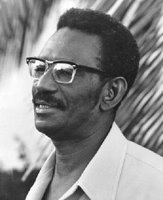World's leading Egyptologist

At this point Egypt continues to dominate the focus of our African oriented studies. These studies have clearly demonstrated that not only were early Egypt's origins African, but that through the whole of Egypt's Dynastic Era (the age of the Pharaohs), and during all of her many periods of national splendor, men and women with black skin complexions, broad noses, full lips, and tightly curled hair, were dominant in both the general population and governing elite.photo
In the intense and unrelenting struggle to establish scientifically the African foundations of Egyptian civilization, the late Senegalese scholar Dr. Cheikh Anta Diop remains a most fierce and ardent champion. Dr. Diop (1923-1986) was without a doubt the world's leading Egyptologist and held the position of Director of the Radiocarbon Laboratory at the Fundamental Institute of Black Africa in Dakar, Senegal. In stating the importance of the work, Diop noted emphatically and early on that, "The history of Black Africa will remain suspended in air and cannot be written correctly until African historians dare to connect it with the history of Egypt."
In the intense and unrelenting struggle to establish scientifically the African foundations of Egyptian civilization, the late Senegalese scholar Dr. Cheikh Anta Diop remains a most fierce and ardent champion. Dr. Diop (1923-1986) was without a doubt the world's leading Egyptologist and held the position of Director of the Radiocarbon Laboratory at the Fundamental Institute of Black Africa in Dakar, Senegal. In stating the importance of the work, Diop noted emphatically and early on that, "The history of Black Africa will remain suspended in air and cannot be written correctly until African historians dare to connect it with the history of Egypt."
The solid range of methodologies employed by Dr. Diop in the course of his extensive Afro-Egyptian labors included: examinations of the epidermis of the mummies of Egyptian kings for verification of their melanin content; precise osteological measurements and meticulous studies in the various relevant areas of anatomy and physical anthropology; careful examinations and comparisons of modern Upper Egyptian and West African blood-types; detailed Afro-Egyptian linguistic studies and the corroboration of distinct Afro-Egyptian cultural traits; documents of racial designations employed by the early Africans themselves; Biblical testimonies and references that address the ancient Egyptian's ethnicity, race and culture; and the writings of early Greek and Roman travelers and scholars describing the physical characteristics of the ancient Egyptians.
There is no doubt that Ancient Egypt was an African civilization.

0 Comments:
Post a Comment
<< Home